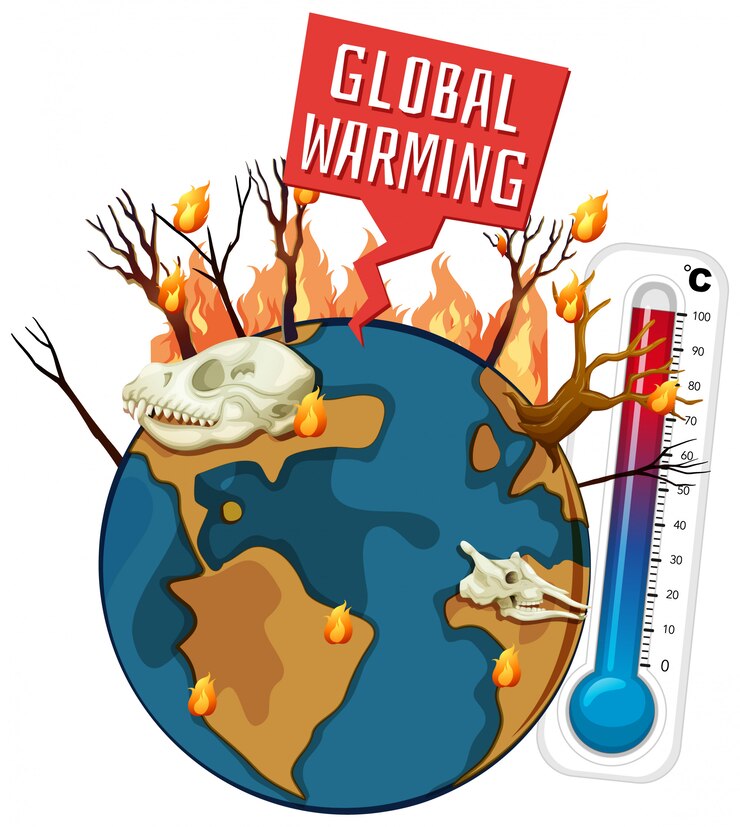Climate Change: The Hidden Health Risk of Our Time

Author: Nr. Chika Jones RN, RM, RPHN, BNSC, Reviewed by Dr Azuka Chinweokwu Ezeike, MBBS, FWACS, FMCOG, MSc (PH)
Highlights
- Climate change is a long-term weather shift caused mainly by fossil fuels.
- Global warming drives extreme weather like floods, droughts, and heat waves.
- It affects health through heat illnesses, pollution, water and food issues, and mental stress.
- Children, the elderly, and the sick are most at risk.
- Cutting emissions and using clean energy can reduce the climate impact.
- Public awareness and stronger health systems are key to fighting climate threats.
Introduction
What is the first thing that comes to mind when you hear climate change? Is it when the weather report is being read on the news? Or knowing which days are the sunniest or rainiest? If that's the first thing that comes up, then you have an idea of what climate change is all about.
However, climate change is more than just sunny or rainy days. Climate change is the gradual and lasting changes in temperature and weather patterns on the earth [1].
The climate change shift can be natural due to the sun's activity or volcanic eruption. However, since the 1880s, human activities like the burning of fossil fuels like coals, oil, and gas have been the main reason behind climate change on Earth [1].
The burning of fossil fuels produces greenhouse gases. Greenhouse gases act as a blanket on the Earth, trapping the sun's heat. This leads to global warming
Another essential factor to note is ozone layer depletion.. It is depleted by the release of chlorocarbons found in refrigerator, air conditioners, hairsprays, deodorant etc.The ozone layer is a shield that prevents harmful ultraviolet radiation from reaching the Earth.Ultraviolet radiation can cause
- Skin cancer
- Premature skin ageing
- Weakened immune system
- Eye damage, etc.
The rise in temperature causes changes in weather patterns. Climate change poses a major threat to global health, affecting the physical and mental health of people [2].
The World Health Organization (WHO) estimates that between 2030 and 2050, about 250,000 additional deaths will result from climate change. This shows the intensity and frequency of climate change's effect on health. Let's take a deeper look at climate change and its effects on health.
Climate Change Versus Global Warming
Global warming and climate change are often used interchangeably, but they have differences. Global warming is when the Earth's surface temperature gradually rises. It's an indication that something is wrong on the Earth. Climate change, on the other hand, is the outcome of global warming. The warning signs could be :
- Frequent drought
- Melting ice caps
- Flooding resulting from melting ice caps
- Heavy rainstorm etc
The Health Impact of Climate Change
Some people are unaware that aside from their environment, climate change can impact their health [3]. You must understand what climate change is and how to protect your health from it. Some of these health effects could be:
- Heat-related diseases
- Air pollution
- Water-borne diseases
- Food insecurity and malnutrition
- Mental health impacts
- Vector-borne diseases
Heat-Related Diseases
One significant sign of climate change is global warming, which occurs when excessive heat is trapped on Earth. This can cause a heat wave, which differs by region and does not have a clear explanation. The World Meteorological Organisation (WMO) defines a heat wave as an average temperature higher than 5°c (9°F) for five or more days.Heat waves can cause
- Heat stress (the body is unable to regulate temperature).
- Heat exhaustion (the body overheats and can lead to heat stroke).
- Heat stroke (the body is overheated and unable to cool itself down).
- Heat syncope (dizziness that results from staying in a hot environment) [4].
Children, the elderly, and individuals with cardiovascular and respiratory conditions are vulnerable during heat waves [4]. Heat-related deaths among those over 65 years have risen by 70% in two decades, according to WHO.
Air Pollution
Climate change could increase the concentration of air pollutants in some regions [5]. Air pollutants can increase from the burning of fossil fuels like coal, industrial activities, automobile emissions, and energy production. These are the sources of particulate matter, sulfur dioxide, carbon monoxide, and carbon dioxide (a greenhouse gas responsible for global warming) [6].Air pollution has a direct effect on people's health. Evidence shows that air pollution has caused millions of early deaths yearly. It affects people with cardiovascular and respiratory conditions, particularly increasing the risk of lung cancer [4].
Waterborne Diseases
Waterborne diseases are illnesses caused by pathogens (such as bacteria, viruses, and protozoa) that are transmitted through contaminated water, posing a risk of infection and disease spread.
Research shows that climate change is likely to increase waterborne diseases, particularly digestive illnesses and diarrhoea [7]. Increased temperature due to global warming and heavy rainfall favour the outbreak of waterborne diseases [4].High temperatures can increase the growth rate of waterborne pathogens. It could also cause drought and lead to water scarìty. Water scarcity could limit access to good drinking water and sanitation [8].Heavy rainfall can cause flooding that could contaminate water from domestic or industrial waste. When the contaminated water is used for bathing or washing, it causes skin and ear infections [4].
Food Insecurity and Malnutrition
Climate change is one of the factors that could cause a food crisis. Rising temperatures, increased sea levels, drought, etc pose a significant challenge to food security globally. This is because recurring droughts or floods cause the farmland to be unproductive. Climate disasters like floods or droughts can destroy an entire harvest.Research estimates that food production will decrease due to increased temperatures caused by global warming. Furthermore, pest and crop diseases would increase.
Climate change makes it difficult for people, particularly children, to get the nutrients they need. This can cause malnutrition or micronutrient deficiency, threatening the child's health [9].
Mental Health Impact
Climate change not only impacts your physical health but also your mental health. Research indicates that climate change can cause changes in mental health, particularly in vulnerable populations like the elderly and children [9].
Climate change can have chronic or acute effects on people's mental health. Acute climatic events like floods, hurricanes, and earthquakes can cause a drastic change in people's mental health. They may explain anxiety over the situation, depression over the loss of property and lives, and stress [4]. In the long run, some may develop post-traumatic stress disorder due to the events they faced.
Vector-borne Diseases
Vectors are organisms that transmit disease. Vector-borne diseases like malaria, dengue fever, and the Zika virus have become more rampant due to climate change factors. Climate change factors like heavy rainfall and warmer climates create a nice breeding ground for the vectors
Addressing the Climate Crisis for Health
Now, we have discussed climate change, the difference between climate change and global warming, and the impact of climate change on human health. Let us discuss how we can solve climate change problems in our environment.
Reduce Greenhouse Gas
Human activities have been the cause of climate change for over a century. It would also require human interventions to reduce the climate change impact on Earth and health.
Greenhouse gases are generated from the burning of fossil fuels like coal, petrol, etc. To reduce greenhouse gases, we need to use renewable energy as a major power source. This has led to the rise of solar energy for houses and electric cars. Other renewable energy sources like hydro and wind power can also be harnessed.
Promoting sustainable transportation is another way to reduce Greenhouse gas emissions. The use of bicycle, walking or public transport helps to reduce over reliance on fossil fuels vehicles.
Conservation and Protection Of the Forest
Forests are carbon sinks (they absorb more carbon dioxide from the atmosphere and reduce the effects of global warming). Deforestation has been on the increase since trees are needed for paper production, building furniture and houses etc.
Forests can be conserved by planting more trees. Reducing over-reliance on trees for production is important. Instead of using paper for notebooks and examinations, it would be better to use digital devices. To minimise exposure to harmful plastics, consider alternatives like reusable cups and bamboo straws, which can help reduce plastic waste and promote a healthier environment.
Public Health Education
There should be increased efforts to teach the public about climate change and its impact on health. This will help to improve preventive measures and reduce the impact of climate change on health.
Policy Formulation
Climate change policies should be made and implemented by all organisations, from individuals to businesses. The policies should be made public so they can be adapted. Examples of climate change policies are:
- The use of hydro, solar, wind, and geothermal power in place of fossil fuels.
- Promoting public transport
- Reducing food waste
- Reducing plastic consumption
- Promoting waste prevention by reduce, reuse and recycle method.
Strengthen Healthcare Systems
Healthcare professionals are faced with managing the acute and chronic effects of climate change. They must be knowledgeable and equipped on how to handle it because they are considered credible sources of information.
Conclusion
Climate change is a serious health threat, not just an environmental issue. It increases the risk of diseases, food insecurity, and mental health challenges. To protect our health, we must act by using renewable energy, promoting public awareness, and strengthening healthcare systems. What action are you making towards a sustainable earth?
References
1.United Nations. What Is Climate Change? [Internet]. United Nations. 2025. Available from: https://www.un.org/en/climatechange/what-is-climate-change
2. Berry HL, Waite TD, Dear KBG, Capon AG, Murray V. The case for systems thinking about climate change and mental health. Nature Climate Change. 2018 Apr;8(4):282–90. Available from https://www.researchgate.net/publication/324146598_The_case_for_systems_thinking_about_climate_change_and_mental_health
3. Casson N, Cameron L, Mauro I, Friesen-Hughes K, Rocque R. Perceptions of the health impacts of climate change among Canadians. BMC Public Health. 2023 Jan 31;23(1). Available from https://bmcpublichealth.biomedcentral.com/articles/10.1186/s12889-023-15105-z
4.Prabhakaran P. Climate change and its impact on human health. Routledge eBooks. 2021 Nov 22;58–66. Available from https://www.researchgate.net/publication/356273402_Climate_change_and_its_impact_on_human_health
5.Ebi KL, Nyong A. The Health Risks of Climate Change [Internet]. 2009. Available from: https://www.researchgate.net/publication/239928465_The_Health_Risks_of_Climate_Change
6. Afifa, Arshad K, Hussain N, Ashraf MH, Saleem MZ. Air pollution and climate change as grand challenges to sustainability. Science of The Total Environment [Internet]. 2024 Jun 10;928:172370. Available from: https://www.sciencedirect.com/science/article/abs/pii/S0048969724025166
7. Gamble JL, Balbus J, Berger M, Bouye K, Campbell V, Chief K, et al. Ch. 9: Populations of Concern. The Impacts of Climate Change on Human Health in the United States: A Scientific Assessment. 2016; Available from https://www.researchgate.net/publication/299612473_Climate_Change_and_Human_Health_in_Populations_of_Concern_Chapter_9_of_USGCRP_Report
8.Balasubramanian A. Global climate change and its impact on human health [Internet]. 2016. Available from: https://www.researchgate.net/publication/311816565_
9.Oche Joseph Otorkpa, Emmanuel S, Obuye F, Chinenye Oche Otorkpa. Impact of Climate Change on Global Health: A Comprehensive Review. International Journal of Environment and Climate Change. 2024 May 24;14(5):342–51. Available from https://www.researchgate.net/publication/380856290
10. Mojahed N, Mohammadkhani MA, Mohamadkhani A. Climate Crises and Developing Vector-Borne Diseases: a Narrative Review. Iranian Journal of Public Health [Internet]. 2022 Dec 26;51(12). Available from: https://www.ncbi.nlm.nih.gov/pmc/articles/PMC9874214/
Disclaimer:
The information provided on this website is for general educational and informational purposes only. It is not intended to replace professional medical advice, diagnosis, or treatment. Always seek the advice of your physician or other qualified health provider with any questions you may have regarding a medical condition.
Published April 19, 2025
